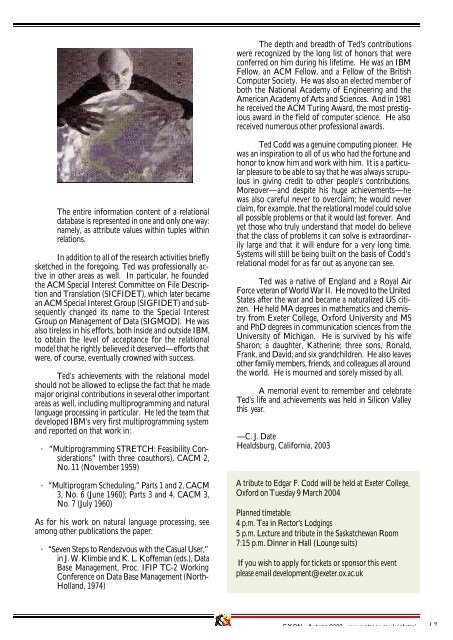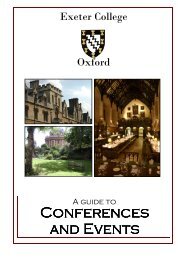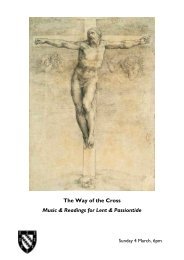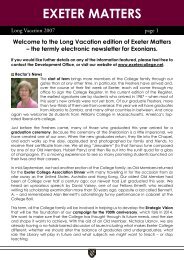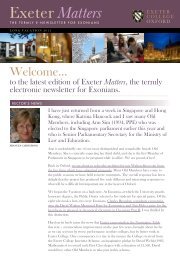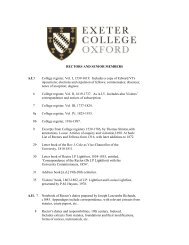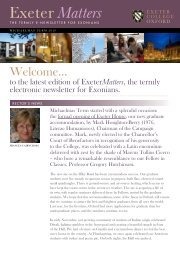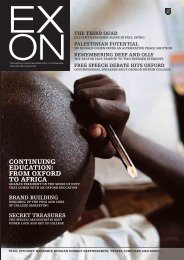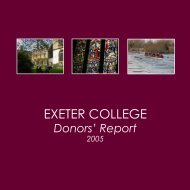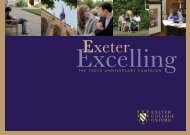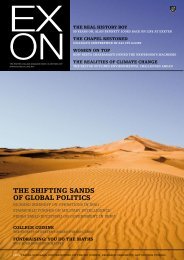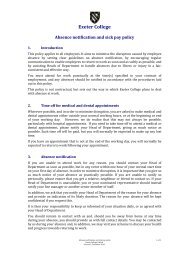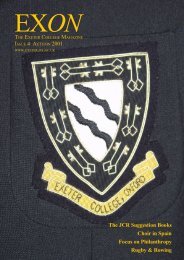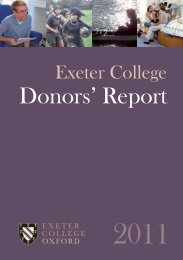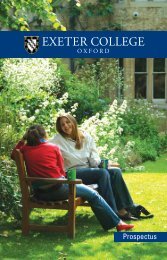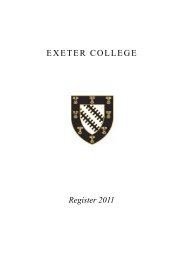2003 - Exeter College - University of Oxford
2003 - Exeter College - University of Oxford
2003 - Exeter College - University of Oxford
Create successful ePaper yourself
Turn your PDF publications into a flip-book with our unique Google optimized e-Paper software.
The depth and breadth <strong>of</strong> Ted’s contributions<br />
were recognized by the long list <strong>of</strong> honors that were<br />
conferred on him during his lifetime. He was an IBM<br />
Fellow, an ACM Fellow, and a Fellow <strong>of</strong> the British<br />
Computer Society. He was also an elected member <strong>of</strong><br />
both the National Academy <strong>of</strong> Engineering and the<br />
American Academy <strong>of</strong> Arts and Sciences. And in 1981<br />
he received the ACM Turing Award, the most prestigious<br />
award in the field <strong>of</strong> computer science. He also<br />
received numerous other pr<strong>of</strong>essional awards.<br />
The entire information content <strong>of</strong> a relational<br />
database is represented in one and only one way:<br />
namely, as attribute values within tuples within<br />
relations.<br />
In addition to all <strong>of</strong> the research activities briefly<br />
sketched in the foregoing, Ted was pr<strong>of</strong>essionally active<br />
in other areas as well. In particular, he founded<br />
the ACM Special Interest Committee on File Description<br />
and Translation (SICFIDET), which later became<br />
an ACM Special Interest Group (SIGFIDET) and subsequently<br />
changed its name to the Special Interest<br />
Group on Management <strong>of</strong> Data (SIGMOD). He was<br />
also tireless in his efforts, both inside and outside IBM,<br />
to obtain the level <strong>of</strong> acceptance for the relational<br />
model that he rightly believed it deserved—efforts that<br />
were, <strong>of</strong> course, eventually crowned with success.<br />
Ted’s achievements with the relational model<br />
should not be allowed to eclipse the fact that he made<br />
major original contributions in several other important<br />
areas as well, including multiprogramming and natural<br />
language processing in particular. He led the team that<br />
developed IBM’s very first multiprogramming system<br />
and reported on that work in:<br />
· “Multiprogramming STRETCH: Feasibility Considerations”<br />
(with three coauthors), CACM 2,<br />
No. 11 (November 1959)<br />
· “Multiprogram Scheduling,” Parts 1 and 2, CACM<br />
3, No. 6 (June 1960); Parts 3 and 4, CACM 3,<br />
No. 7 (July 1960)<br />
As for his work on natural language processing, see<br />
among other publications the paper:<br />
· “Seven Steps to Rendezvous with the Casual User,”<br />
in J. W. Klimbie and K. L. K<strong>of</strong>feman (eds.), Data<br />
Base Management, Proc. IFIP TC-2 Working<br />
Conference on Data Base Management (North-<br />
Holland, 1974)<br />
Ted Codd was a genuine computing pioneer. He<br />
was an inspiration to all <strong>of</strong> us who had the fortune and<br />
honor to know him and work with him. It is a particular<br />
pleasure to be able to say that he was always scrupulous<br />
in giving credit to other people’s contributions.<br />
Moreover—and despite his huge achievements—he<br />
was also careful never to overclaim; he would never<br />
claim, for example, that the relational model could solve<br />
all possible problems or that it would last forever. And<br />
yet those who truly understand that model do believe<br />
that the class <strong>of</strong> problems it can solve is extraordinarily<br />
large and that it will endure for a very long time.<br />
Systems will still be being built on the basis <strong>of</strong> Codd’s<br />
relational model for as far out as anyone can see.<br />
Ted was a native <strong>of</strong> England and a Royal Air<br />
Force veteran <strong>of</strong> World War II. He moved to the United<br />
States after the war and became a naturalized US citizen.<br />
He held MA degrees in mathematics and chemistry<br />
from <strong>Exeter</strong> <strong>College</strong>, <strong>Oxford</strong> <strong>University</strong> and MS<br />
and PhD degrees in communication sciences from the<br />
<strong>University</strong> <strong>of</strong> Michigan. He is survived by his wife<br />
Sharon; a daughter, Katherine; three sons, Ronald,<br />
Frank, and David; and six grandchildren. He also leaves<br />
other family members, friends, and colleagues all around<br />
the world. He is mourned and sorely missed by all.<br />
A memorial event to remember and celebrate<br />
Ted’s life and achievements was held in Silicon Valley<br />
this year.<br />
—C. J. Date<br />
Healdsburg, California, <strong>2003</strong><br />
A tribute to Edgar F. Codd will be held at <strong>Exeter</strong> <strong>College</strong>,<br />
<strong>Oxford</strong> on Tuesday 9 March 2004<br />
Planned timetable:<br />
4 p.m. Tea in Rector's Lodgings<br />
5 p.m. Lecture and tribute in the Saskatchewan Room<br />
7:15 p.m. Dinner in Hall (Lounge suits)<br />
If you wish to apply for tickets or sponsor this event<br />
please email development@exeter.ox.ac.uk<br />
EXON - Autumn <strong>2003</strong> - www.exeter.ox.ac.uk/alumni 17


